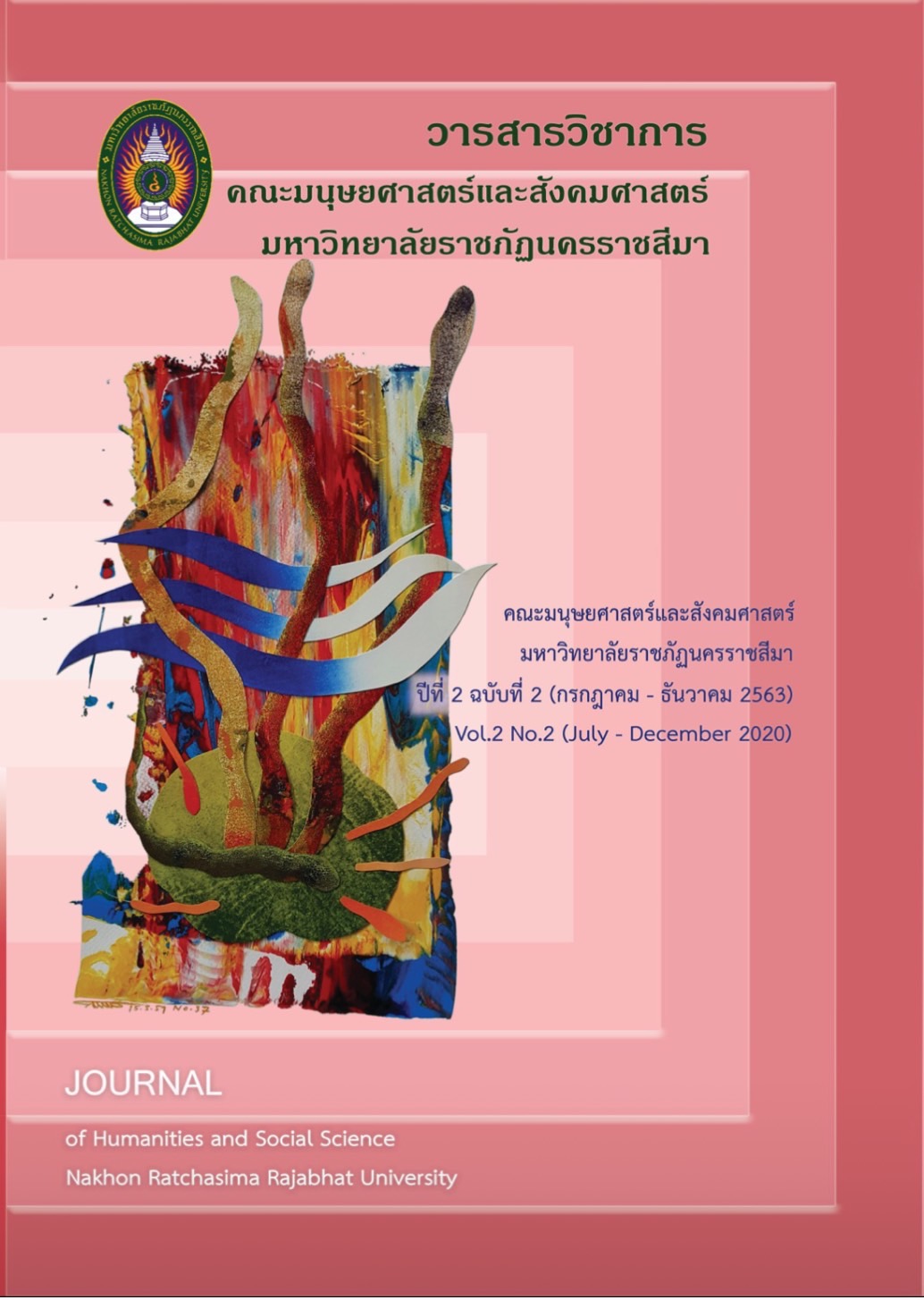ONLINE STUDY PROBLEMS IN HIGHER EDUCATION STUDENTS
Keywords:
online study obstacles, online study problems, higher education studentsAbstract
This study is a part of the research on online study problems in higher education students which aims to 1) analyze online study obstacles in a course named “Speech in Radio and Television”, taught in BA. in Thai Language curriculum, Nakhon Ratchasima Rajabhat University and 2) analyze online study problems in the same course during the pandemic of coronavirus disease 2019 (COVID-19). The study is qualitative research in which the Focus Group Method is employed. The samples selected by Purposive Sampling Method are 110 junior students in the second semester of the academic year 2020 who enroll the course. Both Participant Observation and Non-Participant Observation Methods are also employed in this study to obtain students’ learning behaviors which are further used as supplemental information for the study.
The results found that students confront 4 aspects of online study obstacles. First, in terms of time, the students tend to exceed their due time that they planned to produce their work. Second, in terms of the location, they are disturbed by external noise which consequently affects the on-going work. Third, in terms of production tools, they have insufficient expertise in using sound recording, video cutting, and downloading tool. And fourth, in terms of scriptwriting experience, students confronts problems in balancing content with time limitation. The results also found that students confront 3 aspects of online study problems. First, they have insufficient communicative language proficiency namely pronunciation, expression and pause. Second, they use copyright background songs which affect in increasing production time due to additional permission processes. Third, they confront time management problems because online study mode requires higher responsibility, especially when the students have less chance to meet his or her instructor and other classmates. The research is very beneficial for instruction improvement and can be integrated with other courses in the curriculum.
References
ทิศนา แขมมณี. (2545). ศาสตรการสอน. กรุงเทพมหานคร: โรงพิมพแหงจุฬาลงกรณมหาวิทยาลัย.
ธนพรรณ ทรัพยธนาดล. (2554). ปจจัยที่มีผลกระทบตอการจัดการเรียนการสอนบทเรียนออนไลน. Veridian E-
Journal มหาวิทยาลัยเทคโนโลยีสุรนารี, 4(1), น. 652-666.
เมธาวี จําเนียร และกรกฏ จําเนียร. (2561). ประโยชน ปญหาและแนวทางแกไขการใชสื่อออนไลนในการเรียน
อยางมีประสิทธิภาพของโรงเรียนในจังหวัดนครศรีธรรมราช. วารสารราชพฤกษ, 16(3), น. 113-121.
เรวดี ศรีสุข. (2562). การประยุกตใชทฤษฎีการเรียนรแบบรวมมือ (Co-operative learning) ในการออกแบบ
จัดการเรียนการสอน. วารสารวิทยาลัยบรมราชชนนีนครราชสีมา, 2(1), น. 5-16.
รุสดา จะปะเกีย. (2557). ผลของการจัดการเรียนรูแบบใชปญหาเปนฐานที่มีตอผลสัมฤทธิ์ทางการเรียนชีววิทยา
และความพึงพอใจในการจัดการเรียนรู ของนักเรียนชั้นมัธยมศึกษาปที่ 6. คณะศึกษาศาสตร
มหาวิทยาลัยสงขลานครินทร วิทยาเขตปตตานี.
ศิริพรรณ รัตนะอําพร. (2563). การศึกษาในยุค covid-19. สืบคนเมื่อ 4 สิงหาคม 2564, จาก
https://www.yuvabadhanafoundation.org/th/
สิริพร อินทสนธิ์. (2563). โควิด-19 : กับการเรียนการสอนออนไลน กรณีศึกษา รายวิชาการเขียนโปรแกรมเว็บ.
วารสารสิทยาการจัดการปริทัศน, 22(2), น. 203-213.
สุวิมล มธุรส. (2564). การจัดการศึกษาในระบบออนไลนในยุค NEW NORMAL COVID-19. สืบคนเมื่อ 4
สิงหาคม 2564. จาก file:///C:/Users/wachirarat/Downloads/250336-Article%20Text-892063-
-10-20210512.pdf
หุน-การเงิน. (2564). กสิกรไทยสํารวจผูปกครองรายไดนอยไมพรอมเรียนออนไลน. ประชาชาติธุรกิจ. จาก
https://www.prachachat.net/finance/news-686789
Johnson, D. W., & Johnson, R. T. (1987). Learning together and alone: Cooperative, competitive
and individualistic learning (2nd Ed). Englewood Cliffs, NJ: Prentice-Hall, Inc.


